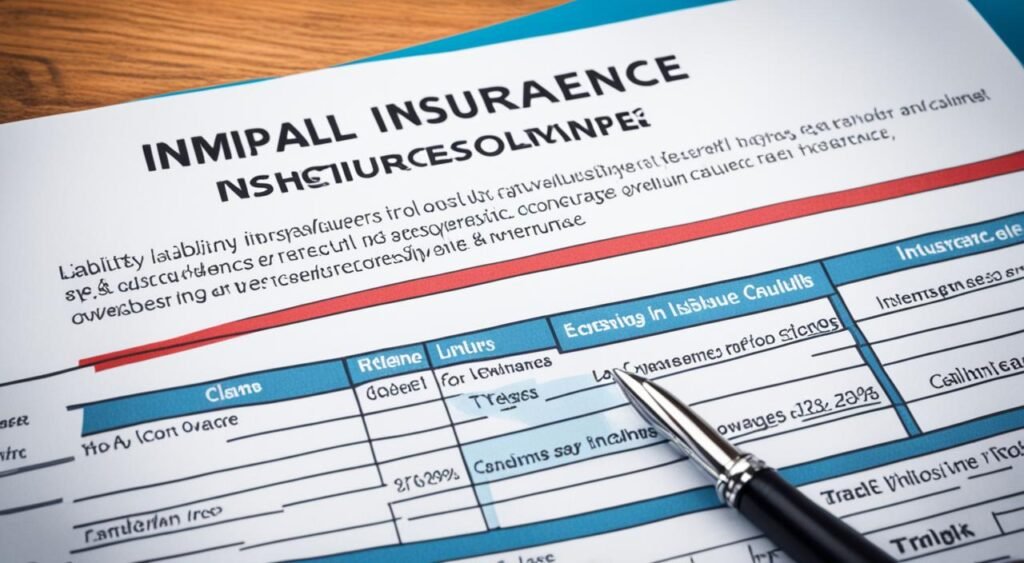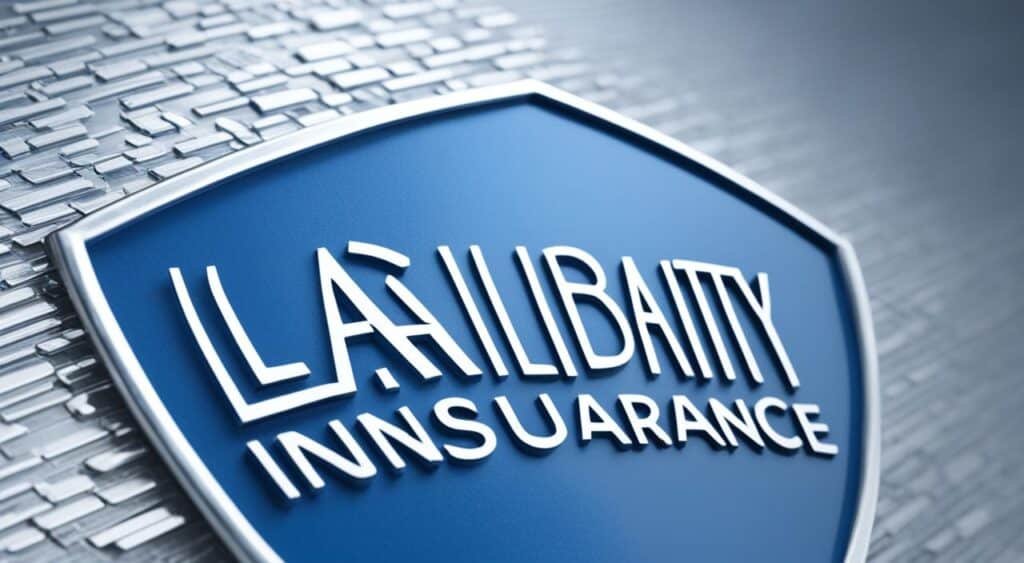Liability insurance is key for a full business insurance plan. It helps protect the money of companies and their owners if they get sued or face claims from third parties. It pays for both financial losses and legal costs due to these claims.
There are three main types of liability insurance for businesses. General liability insurance helps when someone gets hurt in a company’s place, or if the business damages others’ property. It also helps with medical bills from these accidents or injuries at work.
It’s vital for companies to have protection if they are accused of deceitful advertising, like false statements or using others’ work without permission. This insurance is a shield for a company’s reputation and money against such claims.
Key Takeaways
- Liability insurance shields businesses from costs of lawsuits or third-party claims.
- There are three key forms: general, professional, and product liability.
- General liability helps with injuries at work and damage to others’ properties by the business.
- It also covers false or harmful advertising claims, like libel or copyright issues.
- Liability insurance is a cornerstone for a complete business insurance package.
Understanding Business Liability Insurance
Figuring out business liability insurance is key to protecting your company’s future. It shields you from financial dangers linked to various liabilities. This way, your business can keep going without a hitch.
Types of Business Liability Insurance
There are three main kinds of business liability insurance. Thinking about them is important for your company’s safety:
- General Liability Insurance – Defends your business from claims like bodily harm or property damage.
- Professional Liability Insurance – Protects you from allegations of making errors in your professional services.
- Product Liability Insurance – Guards against claims that your product hurt someone or their property.
Liability Insurance for Different Business Structures
How much liability insurance you need changes with your business type. Sole proprietorships and partnerships put their owners’ personal assets at stake. For an LLC, an owner’s personal risk could still be a concern. So, having liability insurance is a must.
Also Read: What Is Vision Insurance And How Does It Work?
“Liability insurance is a crucial safeguard for businesses of all sizes, helping to protect against the financial consequences of unforeseen incidents or claims.”
For any business setup, having enough liability coverage is a smart move. It keeps your business safe and stable.
What Does Liability Insurance Cover?

Liability insurance is key for protecting businesses. It deals with various risks and costs. Two main areas are important: covering legal defense expenses and claims for harm or damage by others.
Legal Defense Costs
Liability insurance is a big help in lawsuits. It covers attorney fees and court expenses. This kind of protection is crucial. It saves businesses from heavy legal costs.
Third-Party Injury and Property Damage Claims
If someone gets hurt or loses property because of your business, liability insurance helps. It covers their medical bills or repair costs. This protection keeps your company safe from big financial hits.
In short, liability insurance tackles legal defences and claims of injury or damage by others. It’s a vital shield for your business against lawsuits and accidents. This safety ensures your business can keep going in the long run.
Also Read: What Is Life Insurance For Kids And What Are The Benefits?
Liability Insurance Coverage for Specific Risks

Businesses are often exposed to various liabilities. It’s vital to have the right insurance for protection. Product liability insurance and professional liability insurance are crucial types.
Product Liability Insurance
Product liability insurance is key for businesses in the manufacturing or sales sector. It covers claims of a product causing harm or damage. If a product injures a consumer, this insurance helps with legal defense and any settlements. It’s indispensable for product makers and sellers to handle their inherent risks.
Professional Liability Insurance
Professional liability insurance, or errors and omissions (E&O) insurance, protects services-based businesses. It covers disputes over services that led to client harm or dissatisfaction. Jobs like accounting, law, consulting, and healthcare often need this to address their specific risks.
Also Read: How To Get Financial Aid For University Of Houston
Product liability insurance and professional liability insurance can boost a broader policy. This adds extra protection against the special risks related to the business’s products or services.
“Liability insurance is essential for businesses that manufacture products or offer professional services, as it helps protect against industry-specific risks and claims.”
The Cost of Liability Insurance

Liability insurance cost is tied heavily to how risky a business seems. Key factors like the business type, where it operates, claims history, and employees count shape the price. Policy choices also play a big role, such as the deductible and coverage limits.
Factors Affecting Premium Costs
High-risk industries, including construction and manufacturing, pay more. Companies located in high-risk areas, like flood zones, also see their premiums increase. This is because of the higher chance of claims.
A history of many or large claims makes a business seem riskier. Such companies will pay higher premiums. On the other hand, companies without many claims might pay less.
Also Read: What Documents Are Needed To File A Car Insurance Claim?
More employees can mean more risk, leading to higher premiums. This is because a bigger company might face more claims for injuries or property damage.
The choices a business makes in their policy also matter. A business can lower its premium by choosing a higher deductible or lower limits. But, this choice can increase the financial risk for the business.
| Factor | Impact on Liability Insurance Premiums |
|---|---|
| Business Risk Level | Higher-risk industries like construction or manufacturing typically pay more |
| Industry | Businesses in higher-risk industries face higher liability insurance costs |
| Location | Companies in high-risk areas like flood zones may pay higher premiums |
| Claims History | Businesses with more claims tend to have higher liability insurance costs |
| Number of Employees | Larger companies with more staff may pay higher liability insurance premiums |
| Policy Deductible | Higher deductibles can lower premium costs, but increase financial risk |
| Coverage Limits | Lower coverage limits can reduce liability insurance costs, but leave the business more exposed |
For lower-risk companies, a Business Owner’s Policy (BOP) combining general liability and property insurance can save money. This might be more cost-effective than buying standalone liability insurance.
“The cost of liability insurance is a critical consideration for any business, as it can have a significant impact on the bottom line. Carefully evaluating the various factors that influence premium costs can help business owners find the right coverage at the most affordable rate.”
Liability Insurance and Risk Management
Liability insurance is key for managing risks in business. It protects not just assets, but also the company name. This coverage moves the risk of lawsuits and claims to the insurance provider. Thus, a business can keep running smoothly, even if faced with a liability issue.
Also Read: What Is Flood Insurance And What Does It Cover?
The right insurance and risk methods can lower the cost of claims. They also keep the business ticking for the long haul. Let’s look at some ways to use liability insurance wisely:
- Risk Assessment – Look into your business’s liability risks regularly. This includes faulty products, mistakes on the job, and safety problems. Knowing these helps match your insurance coverage just right.
- Employee Training – Teach your team how to stay safe and do things correctly. This can lower the chance of facing a liability issue.
- Policy Review – Check your insurance policy often. Make sure it keeps up with changes in your business and new risks.
- Mitigation Measures – Take steps to reduce risks, like improving quality or checking safety often. Being proactive can help avoid many liability issues.
When a strong insurance strategy meets smart risk management, things look up for a business. They can safeguard what’s important, keep their good name, and push forward, despite challenges like unexpected claims.
“Liability insurance is not just a safety net – it’s a strategic tool for managing the risks that come with running a business.”
Umbrella and Excess Liability Insurance

In the business world, standard coverage isn’t always enough. Especially in high-risk fields or against massive claims, umbrella liability insurance and excess liability insurance help companies protect themselves better.
Umbrella liability insurance and excess liability insurance offer more coverage on top of basic liability plans. They come into play when the primary coverage limit is reached. This extra layer ensures the business has enough to cover costs and stay financially secure.
Businesses facing significant liability risks can greatly benefit from this extra coverage. By getting umbrella liability insurance or excess liability insurance, they’re ready for big legal fights. This includes being prepared for large legal costs and judgments.
“Umbrella and excess liability insurance can be a critical safety net for businesses facing the potential for massive liability claims. It’s an investment in the long-term financial security of the company.”
Having umbrella liability insurance and excess liability insurance means your business is better prepared. It’s like having an extra layer of protection against huge claims. With this extra coverage, your business can better withstand major financial hits.
Liability Insurance for Small Businesses
The risks of liability claims can seem big for a small business owner. Even if you have a limited liability corporation (LLC), there’s still personal financial risk in lawsuits. Liability insurance is essential for small businesses to protect their assets from lawsuits.
General liability insurance is very important for small businesses. It helps with costs from things like third-party bodily injury, property damage, and personal injury during business. Without it, one accident could hurt your business’s finances badly.
Professional liability insurance is key for businesses offering professional services. It covers mistakes or omissions in your client work. This insurance helps with legal defense costs and any damages or settlements that might come up.
“Obtaining the right liability insurance coverage is crucial for small businesses to safeguard their assets and mitigate the financial impact of potential lawsuits.”
The liability insurance needs for your business depend on what you do. Think about the services you offer and the potential risks. Work with an experienced insurance provider to make sure you’re properly covered.
Getting liability insurance for small businesses is a smart move. It protects both your personal and business assets. This ensures your company can keep growing and succeeding, even if a lawsuit happens.
Liability Insurance Requirements
Business owners might not always need liability insurance by state law. But in certain cases, like getting a license, it’s a must. Having the right insurance means a business is protected from financial troubles. It also makes sure they follow laws and agreements.
If your business sells liquor or provides services like medicine, you’ll need specific liability insurance. The amount of coverage is often detailed in your lease if you rent a commercial space.
Some states say businesses must have certain insurances, like auto or workers’ comp. It’s vital to follow these laws to keep your company running smoothly.
- Liability insurance may be required to obtain licenses for certain business activities, such as selling liquor or practicing a regulated profession.
- Commercial property leases frequently stipulate minimum liability insurance coverage that tenants must maintain.
- State laws can dictate specific liability insurance requirements, such as for workers’ compensation or commercial auto policies.
- Businesses must comply with all applicable liability insurance laws and contractual obligations to protect their operations and financial well-being.
“Liability insurance is not just a good idea – it’s often a legal necessity for businesses to operate safely and responsibly.”
Business owners should know their insurance needs. This protects against big costs from claims or lawsuits. It also keeps them eligible to serve their customers, as it maintains their licenses and contracts.
Liability Insurance

Liability insurance is key for any business’s risk management. It safeguards companies and their owners against suits or claims. These could be due to injuries, property harm, personal injury, or professional mistakes.
Liability insurance comes in main forms: general liability, professional liability, and product liability coverage. It’s vital for businesses to match their unique risks with the right policies. This ensures their assets and operations are protected.
General liability insurance defends a company against many claims. This includes injuries, property harm, personal injuries, and certain advertising issues. Professional liability insurance helps with mistakes made in services offered. Product liability insurance is for claims about a product causing harm or damage.
Following state laws on liability insurance is crucial. It helps businesses keep their essential licenses and contracts. Companies should closely collaborate with their insurance agents. This is to pick the best policies for their risks and needs.
| Type of Liability Insurance | Coverage |
|---|---|
| General Liability Insurance | Protects against claims of bodily injury, property damage, personal injury, and advertising injury. |
| Professional Liability Insurance | Covers claims of negligence, mistakes, or failure to perform professional services. |
| Product Liability Insurance | Shields businesses from claims related to injuries or damages caused by their products. |
Understanding liability insurance helps businesses make the right choices. It lets them shield their assets and operations. It’s from potential risks and liabilities.
“Liability insurance is not just a luxury, it’s a necessity for businesses of all sizes. Protecting your company from unexpected legal claims and judgments can make the difference between weathering a storm and facing financial ruin.”
Also Read: What Is Surplus Lines Insurance And What Types Of Risks Does It Cover?
Conclusion
Liability insurance is vital for businesses. It protects their financial well-being, ensuring they stay strong over time. This insurance helps by taking on the risk of legal battles and claims from others.
For owners, choosing the right liability policies is key. They should get coverages like general, professional, and product liability. This ensures they meet state rules and keep their business running smoothly.
Liability insurance is crucial for safeguarding business futures. It helps protect assets, handles financial risks, and tackles business liabilities. Making sure their liability coverage is strong is an essential move for any business.
FAQs
Q: Why does my business need liability insurance?
A: Liability insurance is crucial for protecting your business from financial loss in case of accidents, injuries, or property damage that occur on your premises or as a result of your operations.
Q: How does liability insurance work?
A: Liability insurance works by providing coverage for legal costs, settlement fees, and medical expenses that may arise from third-party claims against your business.
Q: What is general liability insurance?
A: General liability insurance is a type of coverage that protects businesses from claims related to bodily injury, property damage, advertising injury, and personal injury.
Q: How much does liability insurance cost?
A: The cost of liability insurance can vary depending on factors such as the size of your business, industry, location, and coverage limits. It is advisable to request quotes from different insurance providers to compare prices.
Q: What type of liability coverage does my business need?
A: The type of liability coverage your business needs will depend on the nature of your operations, the potential risks involved, and any legal requirements specific to your industry. Consult with an insurance professional to determine the appropriate coverage for your business.
Q: What is personal liability insurance?
A: Personal liability insurance provides coverage for legal expenses and damages in case you are found liable for injuring someone or damaging their property, whether the incident occurs on or off your property.
Q: How can I get a general liability insurance quote?
A: You can obtain a general liability insurance quote by contacting insurance companies or using online quote comparison tools. Provide details about your business operations and coverage needs to receive accurate quotes.
Q: What are the types of liability insurance available?
A: Some common types of liability insurance include general liability, professional liability (errors and omissions), product liability, and cyber liability insurance, each designed to protect against specific risks businesses face.
Source Links
- https://www.investopedia.com/terms/b/business-liability-insurance.asp
- https://www.thehartford.com/business-insurance/business-liability
- https://www.thehartford.com/general-liability-insurance/what-does-general-liability-cover





